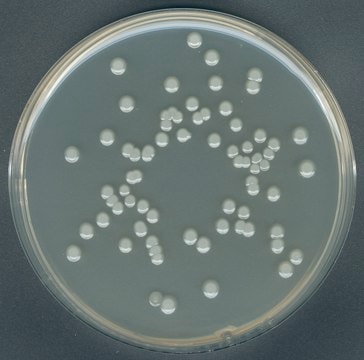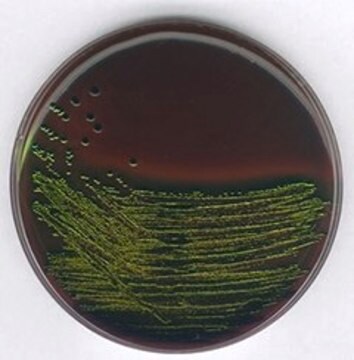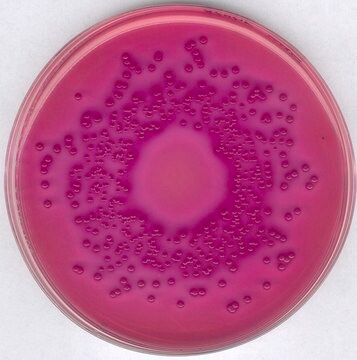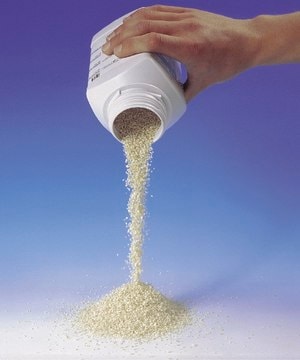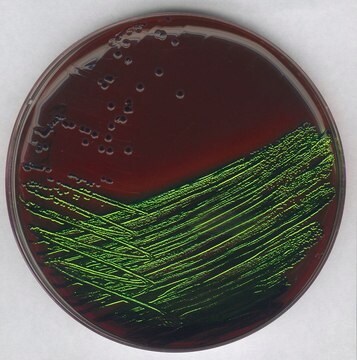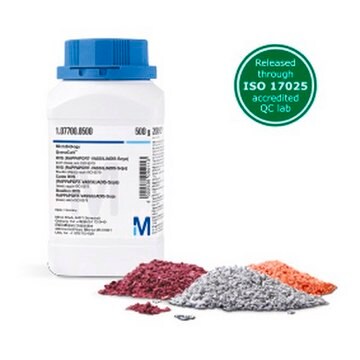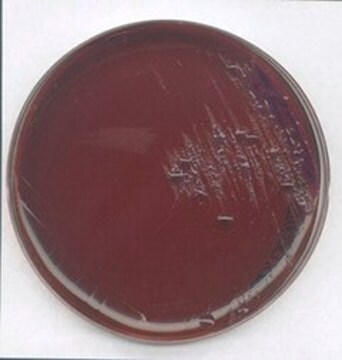1.03858
GranuCult® plus Eosin Methylene Blue Agar
acc. HOLT-HARRIS and TEAGUE; For the isolation and differentiation of E. coli and other gram-negative bacteria
Synonym(s):
EMB agar, Holt-Harris & Teague (HHT) EMB agar, Eosin Methylene Blue Lactose Sucrose agar
About This Item
Recommended Products
Quality Level
form
powder
storage condition
dry media
technique(s)
microbiological culture: suitable
pH
7.1±0.2 (25 °C)
application(s)
food and beverages
pharmaceutical
storage temp.
15-25°C
suitability
selective for coliforms: Citrobacter spp.
selective for enterobacteriaceae (Genus: Proteus Vulgaris)
General description
The peptones provide nitrogen, minerals and amino acids, lactose and sucrose provide the carbon sources. Di-potassium phosphate acts as a buffer whilst Eosin yellowish (Eosin Y) and methylene blue serve as differential indicators and inhibitors. Agar is the solidifying agent.
Coliforms produce blue-black colonies due to the incorporation of an eosin-methylene blue dye complex when the pH drops down. Colonies of Escherichia coli may show a characteristic green metallic luster due to the rapid fermentation of lactose. Lactose- and sucrose-non fermenting bacteria (like most Salmonella and Shigella) will form colourless or transparent amber-coloured colonies, but some strains of Salmonella and Shigella may not grow on this culture medium. Some Gram-positive bacteria and yeasts may grow on this culture medium and usually form pinpoint colonies.
Application
Features and Benefits
- Safe and sustainable due to reduced risks associated with fine dust and toxic substance inhalation, resulting in a safer work environment
- Excellent wettability, solubility, and free flowing properties
- Convenient, with minimal component separation and clumping, even under warm or humid conditions
- High batch-to- batch reproducibility
- Prolonged shelf life of up to five years
- High number of test strains exceeding all regulatory demands
- Granulation technology allowing many supplements to be included, with no need to add these separately
Footnote
The designations basic, plus, or prime are added to indicate the quality control level, from basic quality control to standard QC plus to prime for full regulatory compliance.
Legal Information
signalword
Warning
hcodes
Hazard Classifications
Skin Sens. 1
Storage Class
11 - Combustible Solids
wgk_germany
WGK 2
Certificates of Analysis (COA)
Search for Certificates of Analysis (COA) by entering the products Lot/Batch Number. Lot and Batch Numbers can be found on a product’s label following the words ‘Lot’ or ‘Batch’.
Already Own This Product?
Find documentation for the products that you have recently purchased in the Document Library.
Our team of scientists has experience in all areas of research including Life Science, Material Science, Chemical Synthesis, Chromatography, Analytical and many others.
Contact Technical Service